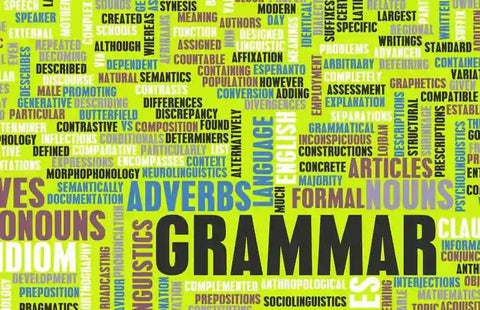The Importance of Good Grammar for Clear Communication
Strange as it may seem to those who aim to produce excellent writing that communicates with precision and eloquence, the validity of fussing over correct grammar seems to have become a hotly debated topic these days, particularly in an online context. Whatever justification for poor writing might be discovered out there on the web, however, the correct and thoughtful use of grammar is still important, and not only when the anticipated audience is sophisticated enough to determine exactly what is right and wrong in an author’s writing. Whether your text is aimed at academics who specialise in language or children who are just learning it; whether you are writing a long scientific treatise or a short blog post, the use of effective grammar really does matter.
Authors write to communicate, and the rules of grammar determine how words should be used and combined in order to communicate an author’s thoughts effectively. Facial expression, voice intonation, physical context and a host of other signifiers present when a speaker stands before a listener are not available when a reader encounters a text. This means that both the main points and any subtleties intended by an author must be expressed in his or her written language, which can prove a significant challenge, but one that must be met to achieve successful and nuanced communication. When reporting the detailed and complicated methods and results of advanced research, for instance, scholars who do not observe the rules of grammar can unintentionally confuse and mislead the readers they hope to inform and persuade, a problem that tends to inspire poor reviews, prevent successful publication and lead to negative comments and citations.
An author’s written voice should create the impression of confidence, especially when considerable knowledge and authority are expected, but many readers will notice errors, particularly if they are frequent and repeated. Assuming these readers do not give up on the text immediately, they will read with uncertainty and caution, a situation that compromises the author’s authority. Those readers unable to detect the errors are still worse off: for them there is a much greater chance of misunderstanding the author’s meaning altogether. For both kinds of readers, poor writing provides a poor model and suggests that imprecise and confusing communication is acceptable.
Readers have learned to ignore or skip over grammatical errors in much of the text produced for online contexts, yet this is a sad necessity, not justification for perpetuating hasty and sloppy work that even its own author could not be bothered to honour with proofreading. Yes, errors creep into writing, and yes, they sometimes squeak through even the most stringent editorial policies, but there is no real argument for poor grammar. If you have something you believe important enough to write, present, post or upload, do yourself and your readers a favour by proofreading it carefully, and if you have neither the skill nor the inclination to do so, hire a professional proofreader or editor to ensure that your work will be taken seriously and help you achieve your goals.
Why Our Editing and Proofreading Services?
At Proof-Reading-Service.com we offer the highest quality journal article editing, dissertation proofreading and online proofreading services via our large and extremely dedicated team of academic and scientific professionals. All of our proofreaders are native speakers of English who have earned their own postgraduate degrees, and their areas of specialisation cover such a wide range of disciplines that we are able to help our international clientele with research editing to improve and perfect all kinds of academic manuscripts for successful publication. Many of the carefully trained members of our manuscript editing and proofreading team work predominantly on articles intended for publication in scholarly journals, applying painstaking journal editing standards to ensure that the references and formatting used in each paper are in conformity with the journal’s instructions for authors and to correct any grammar, spelling, punctuation or simple typing errors. In this way, we enable our clients to report their research in the clear and accurate ways required to impress acquisitions proofreaders and achieve publication.
Our scientific proofreading services for the authors of a wide variety of scientific journal papers are especially popular, but we also offer manuscript proofreading services and have the experience and expertise to proofread and edit manuscripts in all scholarly disciplines, as well as beyond them. We have team members who specialise in medical proofreading services, and some of our experts dedicate their time exclusively to dissertation proofreading and manuscript proofreading, offering academics the opportunity to improve their use of formatting and language through the most exacting PhD thesis editing and journal article proofreading practices. Whether you are preparing a conference paper for presentation, polishing a progress report to share with colleagues, or facing the daunting task of editing and perfecting any kind of scholarly document for publication, a qualified member of our professional team can provide invaluable assistance and give you greater confidence in your written work.
If you are in the process of preparing an article for an academic or scientific journal, or planning one for the near future, you may well be interested in a new book, Guide to Journal Publication, which is available on our Tips and Advice on Publishing Research in Journals website.








